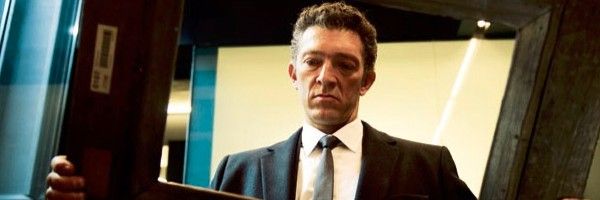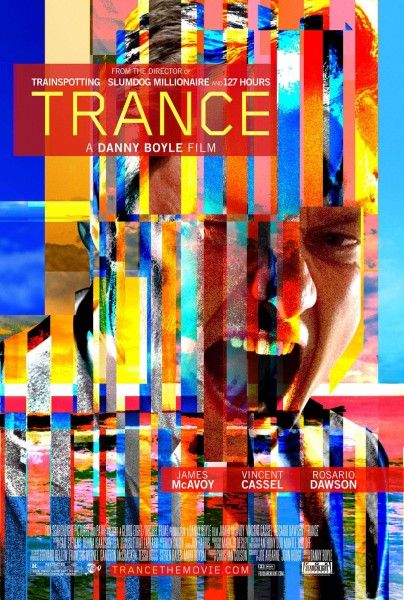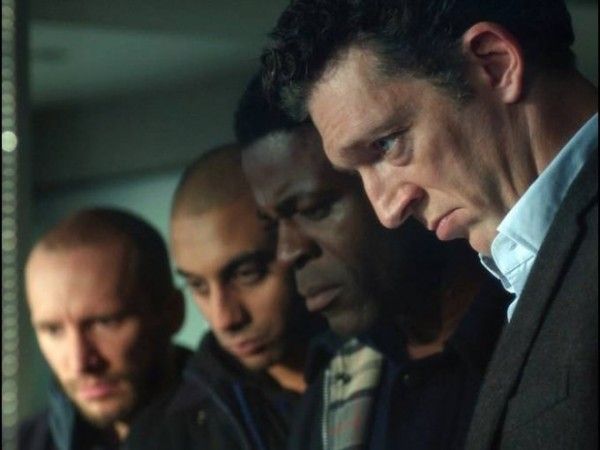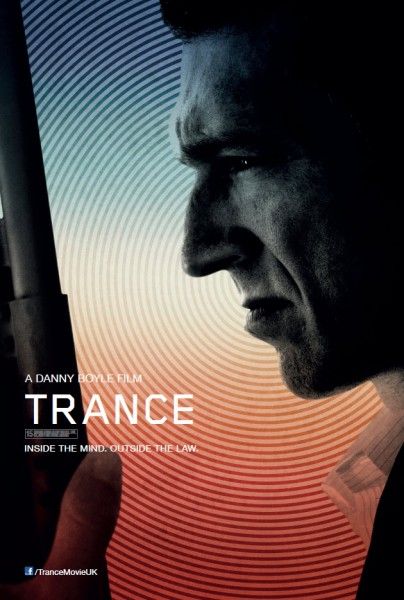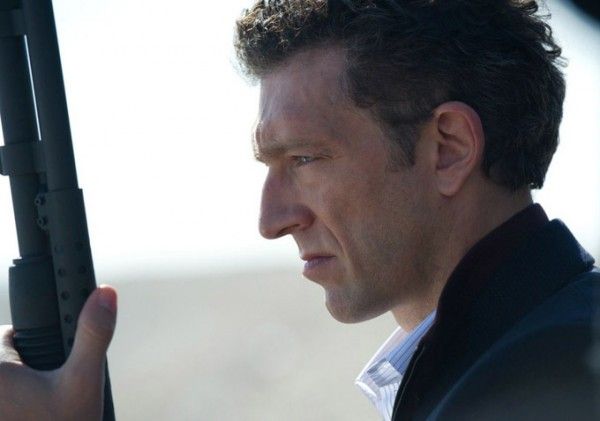In Danny Boyle’s hypnotic thriller Trance, Vincent Cassel plays Franck, a ruthless art thief determined to locate a stolen Goya painting who turns to a seductive hypnotherapist (Rosario Dawson) for help when violent coercion fails. Nothing is ever quite what it seems in this stylish thrill ride filled with hallucinations, dream sequences, and unreliable narrators. In fact, Cassel considers Franck the most normal of all the film’s characters. Not only is he the closest to the audience and the easiest to follow, but he’s also a gangster that falls in love, so he can’t be totally bad.
At the recent press day, the Cesar award-winning French actor talked about his character, the appeal of working with a director like Boyle, why he’s skeptical of hypnotherapy, what it was like shooting his torture scene with James McAvoy, how an international cast made the film’s plot more intriguing, and why he likes the idea of a strong female lead that’s smart and beautiful. He also discussed his upcoming film, A Samba Drama, set during Carnival in Rio de Janeiro. Hit the jump to read more:
Question: Usually you play the bad guy, but in this case, you’re more ambivalent and there is a much more human aspect to your character. Can you talk about that?
Vincent Cassel: I agree. This guy starts out as obviously a bad guy, because he’s torturing this poor James McAvoy who deserves it (laughs), but finally he’s a gangster that falls in love. Somebody that falls in love can’t be totally bad.
Rosario Dawson told us the cast went to see a hypnotherapist, but you were very skeptical and you didn’t believe any of it. Did your attitude in real life help with your character?
Cassel: When the guy came to see us and he tried to hypnotize us, I mean, c’mon! I wish it would have worked. I was desperately trying to lose myself and stay [focused], but it didn’t work. C’mon! It has to work, even though you don’t believe it, otherwise, if you have to do all the work, then yeah, anything [can happen]. For some people, you just say “Jump” and they jump, but I don’t think it’s a good sign.
So you’re not the five percent?
Cassel: No. I don’t think so. But I really think Franck is the closest character to the audience. He doesn’t know anything. He doesn’t have to lie. What does he want? He wants the painting. The other ones are lying. Rosario’s character, Elizabeth, is lying and she’s terrible. She’s the boss, I think. I find it very refreshing, by the way, to see a role with a beautiful actress that can be smart and win at the end of the movie. She has to lie, of course. She really has to lie. James’s character doesn’t lie but he’s very mixed up. He forgot about part of his life and everything. My character is very normal when you think about it. He wants something and finally he gets something. He falls in love. He’s a very easy character to follow. I wasn’t going to force myself to believe in that, especially knowing that my character doesn’t.
Do you really believe they fell in love? Were Franck’s feelings genuine or were they manipulated by Elizabeth because of who she is?
Cassel: I think that’s what he likes. She’s as bad as he is. He’s a gangster and she’s a gangster bitch. (laughs) No, I think he sees somebody who is as strong as he is. I wouldn’t say that’s common but I’ve seen that before, not in movies but in life. You fall in love with somebody that can challenge you for real and she definitely can challenge him. He sees some kind of alter ego. I think she really feels for him, too, by the end. The end changed at a certain point. It wasn’t really ending like this. Now the way it is, they might have kids one day.
Do you think your character would want kids? He’d have to give up being a gangster.
Cassel: Well, he’s a businessman. He has his club. No, it’s true. I don’t think he’s a straight gangster. He’s a guy who has this club. If you’ve got a club like he does, you don’t need to do what he does on the side. It’s a part time job. I think he really loves art, by the way. I do. And so, he doesn’t depend on that. Plus, you can be a gangster, or somebody who works on the illegal side of the law, and still want to have kids.
Would he be nicer?
Cassel: Well I have this theory that if kids really made all the parents better, there wouldn’t be crazy kids in the world.
Can you talk about the torture scene with James and what that was like for both of you?
Cassel: These kinds of things work on screen, but on set, you have this guy going, “Wait, wait. I have to glue it a little more. Let’s have some more blood.” “Action!” “Ahhhhh!” It’s not boring, but nobody’s like, “Oh!” I mean, the effect doesn’t work on set. It works on camera. When you have blood and special effects involved, it’s kind of boring because it takes more time. It’s like my face when it’s blown off. They have to glue this thing, but it looks really good. When I read the script, I think I get shot in the head on page 15. I see in a line that he gets shot in the head. So (whistles), I’m not doing this movie. And then, I realized I was still talking and it was a dream, so it was okay. No, those things work in the movie, but not on set. I think it’s much more moving or strange to have somebody acting and having an emotion on set than those other things. When somebody is talking to you about something terrible on set with lines, and you believe what he says, sometimes it gives a strange vibe, because you wonder when that person is talking if he’s talking about something that really happened to him and he’s using the character. When you have this fine line that is blurring, then it’s kind of strange. But blood, especially fake, and guns, this is bullshit. It works in the movie, but on set it doesn’t work for me.
You’ve worked with some incredible filmmakers throughout your career. What did you find unique or distinctive about Danny?
Cassel: First of all, he tried a lot of different things. It’s always interesting to see a director trying different things, and on top of it, doing it right each and almost every time. When Trainspotting came out in France, it was the same year as one of my first movies called La Haine (Hate), and there was a comparison between both movies in France. They called it The British Lion. We went to see the movie with an eye. We wanted to see what it was about, and if there was something in common. One was talking about the suburbs and this lost generation that went through drugs, and the other one had more to do with police violence, but there was something [in common]. They were the same kind of generational movies in Europe. And so, I always kept an eye on what he was doing and I was very interested in everything. When he called me, it felt almost normal. I was like, “Ah, finally!” (laughs) But I was still very flattered.
Can you talk about the international cast of the film? You have a British director, a Scottish actor, you’re French and Rosario is American. Did that make the plot more intriguing, and if this had been an all-British cast, would it have been as interesting?
Cassel: No, for sure. (laughs) I think it’s one of the trademarks of Danny. He likes to mix. He has this vision of London which is totally true. It’s very mixed. So he always tends to mix, and he had this idea that he wanted the cast to be a mix from all over the place. He really likes Scottish actors, but that’s his problem. I don’t know why he’s like that.
He’s enamored with Scotland?
Cassel: Yeah, he said it. He’s really fascinated by Scots.
Do you have a preference between international film productions and Hollywood style movies? Is there one that you prefer to make or is it all just the same?
Cassel: I don’t identify with things like that. It’s really about the director. Plus, I haven’t been part of a real Hollywood movie. (Steven) Soderbergh is not a Hollywood director to me. He’s an auteur and he does all kinds of things. He does Solaris and then he lights his movies. He’s totally free. He has the final cut. He’s one of the only ones. (David) Cronenberg is definitely not Hollywood. Neither is (Darren) Aronofsky. They’re just English-speaking movies, but it doesn’t make them Hollywood. Hollywood, for me, is the studios. It’s a way to produce. It’s a different way to make movies, and I never took part in that.
Is that on purpose or are you not interested?
Cassel: Nothing came up that was interesting enough for me to be a part of it. I’m not racist in that sense. If something comes up, and it’s very interesting with a wonderful director and it’s produced by a studio, I’ll make it. But, up until now, the things that came to me were really… I mean, I haven’t missed anything. I’ve seen the movies sometimes afterwards, and I’m like, “Ooof! What a nice move.”
What was it about Trance that you really liked? Was it the appeal of working with Danny or was it the story or a combination?
Cassel: Well, Danny definitely. Plus, I think it’s very well written. It’s a smart movie. All the characters, each and every one of us, have such a different and pretty wide range of emotions and things to show. I like the idea of suddenly we have a movie with a female part that is solid and with an actress that can be beautiful and smart. It’s pretty rare and I like to see that, maybe because my wife (Monica Bellucci) is beautiful, and I see the kinds of tricks that go on, that actresses have to play ugly to be recognized and identified as good actresses, which is totally stupid.
I like your wife’s work and I miss seeing her on screen. How do the two of you balance your careers?
Cassel: It’s a mystery. It works. Up until now, it’s been okay. We juggle and it works. The kids are the main priority anyway. If you keep that in mind, then you make the choices in that direction. Neither of us are workaholics. I think the key thing is to accept that if you only exist through what you do, then you become what you do, and this is very wrong. We don’t have a lot of things in common and we’re very different, but in that sense, we think the same way. We don’t accept everything. We don’t spend 90 percent of our time on sets. I make two movies a year. That gives me enough time to get home and do things that I can do from home, and she’s the same, so it works.
You mentioned some of the interesting directors you’ve worked with who all have very unique visual styles. Do you sometimes wish you could do your work and not worry about where the camera is?
Cassel: No, because you need to understand how you are looked at, strangely enough. That’s what gives you the main direction. This is what the main direction is. How is the director looking at you? And how the director is looking at you has a lot to do with where the camera is. Plus, the good directors don’t move like this (meaning all over the place). It’s very precise and it tells a story. That’s a connection with the director. You have to understand what’s going on somehow. What I’m saying is you understand it not in an analytic way. It’s more like you have to feel what’s going on. If the camera is sloppy or wrong, or if the director is a shit, then I can’t act anymore. I don’t know what to do. I get angry. I can’t focus my energy. It’s like photographers. If the guy behind the camera is not good, the pictures are bad. It’s still you, and it’s the same lines and everything, but it doesn’t work.
You’ve had a pretty good track record with the directors you’ve worked with?
Cassel: That’s right, but I don’t work that much. Plus, I think life is short, and you can’t spend time doing things just to be on set to reassure yourself that people are not going to forget about you.
Does the high standard feel like a luxury or does it sometimes frustrate you looking for the movies that you feel are worth giving your time to?
Cassel: It’s a luxury, but I like it like that. I mean, the few times in my life where I had four or five movies in a row, it was a nightmare. I felt trapped. I felt like my life was planned for a year and a half or two years and it was terrible. Most of the time, everything collapsed. (laughs) Instead of being sad, I felt free. And when you have a bunch of scripts that you have to read, the less you have, the better it is, because otherwise, everything is already planned and I think that’s a terrible feeling.
Is there something you feel very passionate about other than filmmaking? Is there another pursuit you are equally interested in?
Cassel: You mean if there is something else for me other than work? Yes, definitely. I do a bunch of stuff. I travel around. I produce, which is work, but it’s a different way to work. The thing is, as an actor, I get bored a little bit. I love to act. And between action and cuts, when you work for somebody great, it’s wonderful and I still love it. The moment where you create, that instant is still magic to me. But, all the rest, I get bored with it – all the waiting, and the fact that you have to make appearances, that you have to share your life. More and more, you go to shows. I mean, not here in America, because I’m not that used to this in America. You have to come with your friends. You have to come with what you like. You have to do the show instead of them. That’s not why I wanted to be an actor. I wanted to be an actor to act, and now, being an actor, you have to dress up, you have to be nice, you have to be smart, you have to be sexy, you have to be ready. Oh!
Cassel: Yes, I write. I do things that I can do by myself. (laughs)
You don’t have to dress up when you’re writing.
Cassel: I can escape.
Can you comment on your new project, Samba Drama in Rio? How is it going?
Cassel: Actually, the title is not going to be Samba Drama. It’s A Samba Drama. It’s that kind of movie. I lost the director who was supposed to do it, so it’s going to take a little more time, I think, but it’s going to happen. That’s one of the reasons why I moved there.
Is the story about Carnival?
Cassel: There’s a piece of the story that happens during the Carnival.
Is your wife going to play in it?
Cassel: I can’t really talk about it anymore. I’m sorry. You’ll know when it’s going to happen.
How is life in Rio?
Cassel: I love it. I like Rio. Coming from Paris, I’d really like to live in Rio. It’s the right moment to live in Rio. I think it’s gotten better. It’s not as violent. The economy is better. The middle class is rising.
And the beaches don’t hurt.
Cassel: It’s funny. Since I have lived there, I don’t go too much to the beach because I’m busy. But Eduardo Paes (the mayor of Rio de Janeiro) is pretty good at what he does. Altogether, I think it was the right timing.

